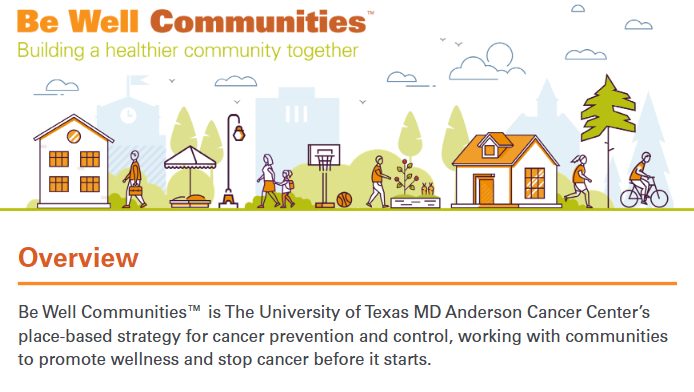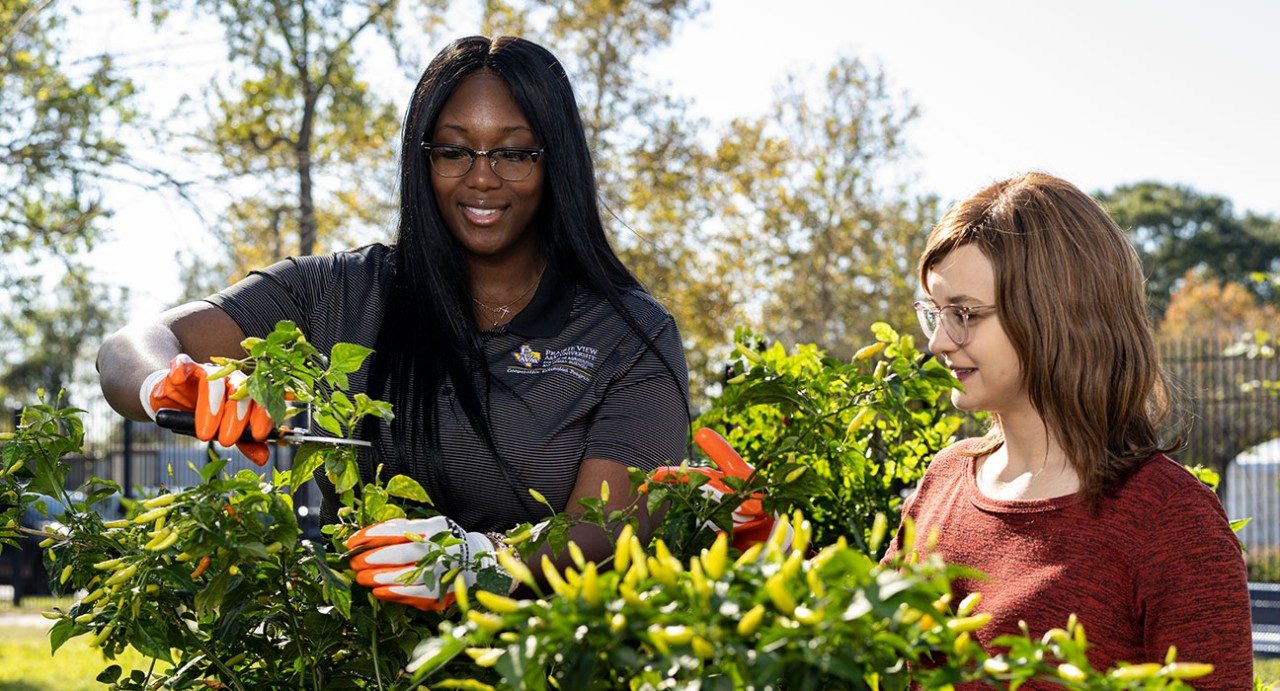Cancer prevention advances our mission
Be Well Communities
Cancer prevention is a cornerstone of MD Anderson’s mission to eliminate cancer. Research estimates that up to half of cancer cases in the United States could be prevented at a population level. MD Anderson supports community-led efforts that can directly impact cancer risk reduction.
Our Approach
Be Well Communities™ is MD Anderson's place-based strategy for comprehensive cancer prevention and control, working with communities to promote wellness and stop cancer before it starts. We unite individuals, schools, workplaces, government agencies, health care providers and policymakers to plan and carry out sustainable, community-led solutions that will make positive, long-lasting changes in people’s lives.
Be Well Communities is an initiative of the Cancer Prevention and Control Platform.
We work collaboratively with residents and community-based organizations to implement evidence-based strategies that can reduce the risk of cancer with a focus on five key areas:
Our Model
Be Well Communities is built on 100 years of healthy community initiative best practices, literature and experience. The model centers on working with community-based organizations to build their capacity to deliver and evaluate evidence-based interventions. We create strong community linkages, advance professional and policy changes, establish an active health coalition, and create a sustainability plan to transition the initiative to the community.
Our Impact
Together with strong community partners, this work is already making tangible differences in communities throughout Houston and Southeast Texas.
More than 80 local, regional and state organizations are actively engaged on Be Well Communities steering committees, guiding the implementation of each action plan in partnership with residents in each community.
Since 2017, key milestones included:
- Built capacity of community partners to increase access to healthy eating:
- Over 21 million pounds of healthy food have been distributed to families
- Invested in built environment and integrated active living into communities:
- 108 sunshades and non-permanent umbrellas have been installed at city parks, schools and college campuses
- 91,000+ students have participated in school-based health and physical activity programs
- Prioritized actions to prevent cancer and other chronic diseases:
- 12,000+ community members have received tobacco-free resources
- 57 school-based and community-based clinics provided 1,717 free immunizations to adolescents, including the HPV vaccine
- Over 9,500 cancer screenings have been provided
If you need a more accessible version of the materials and information provided as a PDF, please contact us at BeWellCommunities@MDAnderson.org.
Current Communities
Be Well™ Beaumont
Be Well Beaumont is an initiative of MD Anderson, sponsored by ExxonMobil. Launched in 2025, this initiative has convened more than 40 local organizations to guide the implementation of cancer prevention activities that will build a healthier Beaumont.
Learn more about Be Well Beaumont
Be Well™ Acres Homes
Be Well Acres Homes is an initiative of MD Anderson in collaboration with the Acres Home Chamber for Business and Economic Development, Inc., the Acres Homes Super Neighborhood Council and more than 30 community organizations united together with residents of Acres Homes. This initiative began in 2020 and was made possible through philanthropic investments from MD Anderson.
Learn more about Be Well Acres Homes
Be Well™ Baytown
In 2016, MD Anderson united with the community of Baytown, Texas, to launch the first, most comprehensive, community-driven health initiative of its kind in the state of Texas. This initiative was made possible through a philanthropic investment from ExxonMobil to MD Anderson to benefit a Houston-area community.
Learn more about Be Well Baytown
Pasadena Vibrant Community
In 2016, MD Anderson united with the community of Pasadena, Texas, to mobilize health and wellness in the community. This initiative was made possible by investment from and collaboration with Shell USA Inc. As of 2021, this initiative has transitioned to the sustainability phase, and 90% of all interventions have been completed or integrated into the collaborating organizations’ strategic plan for ongoing implementation.
Learn more about the impact of this initiative (downloads as a PDF)
Be Well Communities has been instrumental in convening key organizations and leaders to identify and implement strategies that will build a healthier Beaumont.
Norma Sampson
Gift of Life
Contact Us
For more information, email us at BeWellCommunities@MDAnderson.org
Publications
Place-based investments in health
- Raber M, Oestman K, Rumfield L, et al. Be Well Baytown: Whole-Community Cancer Prevention Initiative Based on Multi-Sector Capacity and Partnership Building. Cancer Control, 32 (2025). https://doi.org/10.1177/10732748251347584
- Williams PA, Oestman K, Treiman K, Zulkiewicz B, Rivell A, Walsh MT, Rechis R. Evaluating multifaceted community-based health initiatives: A case study of a population health initiative. RTI Press, Methods Report No. MR-0056-2505 (2025). https://doi.org/10.3768/rtipress.2025.mr.0056.2505
- Oestman K, Raber M, Walsh MT, Rechis R. Sustaining health promotion efforts through community coalition localization: Implications for community-wide interventions utilizing multi-sector partnerships. Progress in Community Health Partnerships (2025). https://preprint.press.jhu.edu/pchp/sites/default/files/2025-03/PP_Raber.pdf
- Raber M, Love B, Vazquez M, Ghosh C, Rechis R, Oestman K, Ho-Pham T, LaRue D, Walsh Jr. MT, Kizub D, Ma H, Basen-Engquist K. Nutrition Security During Cancer: A Qualitative Investigation Among Patients with Cancer on Active Treatment From an Area of Persistent Poverty. Cancer Reports (2025). https://doi.org/10.1002/cnr2.70141
- Kizub DA, Raber M, Baum M, Ma HY, Patel TA, Rechis R, LaRue DM, Ho-Pham TT, Oestman K, Walsh MT Jr, Galvan E, Basen-Engquist K. Patient and Health Care Professional Perspectives on Barriers to and Facilitators of Healthy Eating and Exercise Among Patients With Cancer at a Safety-Net Oncology Clinic: A Qualitative Exploration. JCO Oncology Practice, 21:7 (2025). https://doi.org/10.1200/OP.24.00431
- Loomba P, Raber M, Aquino M, Rincon N, Rumfield L, Basen-Engquist K, Rechis R. Enhancing food access in a comprehensive cancer center area of influence through local partner capacity building. Cancer Medicine. (2024). https://doi.org/10.1002/cam4.70070
- Love B, Coffman R, Ghosh C, Cofer J, Hurst A, Oestman K, Aquino M, Kriss L, Shah M, Dermid G, Raber M, Hawk E, Walsh M, Rechis R. Implementation and Evaluation of a Multi-level, Place-Based Tobacco Prevention and Control Program at a Minority-Serving Institution in Texas. Prevention Science. (2024). https://doi.org/10.1007/s11121-024-01708-4
- Love B, Ghosh C, Kriss L, Vieco-Garcia M, Fick H, Shin E, Wager J, De Luca D, Dermid G, McDonald L, Caballero E, Oestman K, Coffman R, Aquino M, Adams T, Gardiner H, Rechis R. Building and Maintaining a Whole Community Initiative: Health Communication in Practice with Be Well Communities™. Health Communication, 1–9 (2024). https://doi.org/10.1080/10410236.2024.2382869
- Love B, Ghosh C, Oestman K, Aquino M, Coffman R, Shah M, Dermid G, Rechis R. Understanding the impact of community-based sun safety interventions on a college campus in Texas. Journal of American College Health, 1–8 (2024). https://doi.org/10.1080/07448481.2024.2367989
- Oestman K, Rechis R, Williams P. et al. Reducing risk for chronic disease: evaluation of a collective community approach to sustainable evidence-based health programming. BMC Public Health 24, 240 (2024). https://doi.org/10.1186/s12889-024-17670-3
- Rechis R, Oestman KB, Walsh MT, Love B, Hawk EH. Be Well™ Acres Homes: a community-driven, evidence-based approach to reduce health inequities through sustained cross-sector partnership. Cancer Causes Control (2023). https://doi.org/10.1007/s10552-023-01818-4
- Tran T, Song S, Texeira A, Rechis R, Nelson K. Educational interventions to promote sun-protection behaviors in adolescents in the United States: A systematic review. Pediatric Dermatology, 1-5 (2023). doi: 10.1111/pde.15335
- An evaluation of aligning systems for health in Texas: What works, for whom, and under what circumstances for advancing health equity. Comprehensive report. Texas Health Institute (August 2022).
- Community Outreach and Engagement: The University of Texas MD Anderson Cancer Center case study. National Cancer Institute. (2022).
- Raber M, Rechis R, LaRue D, Ho-Pham T, Oestman K, Walsh M, Kizub D, Ma H, Galvan E, Zhao H, Gonzalez X, Hu J, Basen-Engquist K. Enhancing the utilization of healthy living interventions among cancer survivors in historically underserved populations and communities. Cancer Causes Control (2023). https://doi.org/10.1007/s10552-023-01701-2
- Raber M, Robertson M, Le T, Gatus L, Rechis R, Oestman K, Basen-Engquist K. Patterns of home cooking practices among participants in a behavioral weight loss program: A latent class analysis. Appetite, 184 (2023). https://doi.org/10.1016/j.appet.2023.106504.
- Lee C, Robertson M, Johnston H, Le T, Raber M, Rechis R, Oestman K, Neff A, Macneish A, Basen-Engquist K. Feasibility and Effectiveness of a Worksite-Weight-Loss Program for Cancer Prevention among School-District Employees with Overweight and Obesity. International Journal of Environmental Research in Public Health, 20:1 (2022). https://doi.org/10.3390/ijerph20010538
- Lee C, Robertson M, Servino K, Le T, Raber M, Oestman K, Basen-Engquist K. Impact of COVID-19 on a worksite weight loss program for employees with overweight and obesity. Obesity Science and Practice, 1-9 (2022). https://doi.org/10.1002/osp4.653
- Robertson M, Lee C, Wu I, Liao Y, Raber M, Parker N, Le T, Gatus L, Basen-Engquist K. Changes in physical activity associated with the COVID-19 pandemic in individuals with overweight and obesity: an interrupted time series analysis with historical controls. Journal of Behavioral Medicine, 45:2 (2022). https://doi.org/10.1007/s10865-021-00261-7
- Robertson M, Raber M, Liao Y, Wu I, Parker N, Gatus L, Le T, Durand C, Basen-Engquist K. Patterns of self-monitoring technology use and weight loss in people with overweight or obesity. Translational Behavioral Medicine, 11:8 (2021). https://doi.org/10.1093/tbm/ibab015
- Rechis R, Oestman K, Caballero E, Brewster A, Walsh M, Basen-Engquist K, Gershenwald J, Tektiridis J, Moreno M, Williams P, Treiman K, Garza P, Hawk E. Be Well Communities™: Mobilizing communities to promote wellness and stop cancer before it starts. Cancer Causes & Control (2021). https://doi.org/10.1007/s10552-021-01439-9
- Liao Y, Robertson M, Winne A, Wu I, Le T, Balachandran D, Basen-Engquist K. Investigating the within-person relationships between activity levels and sleep duration using Fitbit data. Translational Behavioral Medicine, 11:2 (2021). https://doi.org/10.1093/tbm/ibaa071
- Robertson M, Green C, Liao Y, Durand C, Basen-Engquist K. Self-efficacy and Physical Activity in Overweight and Obese Adults Participating in a Worksite Weight Loss Intervention: Multistate Modeling of Wearable Device Data. Cancer Epidemiology Biomarkers and Prevention, 29:4 (2020). https://doi.org/10.1158/1055-9965.EPI-19-0907
- The Practical Playbook II, Building Multisector Partnerships That Work, Michener JL, Castrucci, Bradley DW, et al. Section V, Sustainability and Finance: Supporting Partnerships over Time, Chapter 38, “Case Study: BUILDing Ties with the Business Community.” Katherine Oestman, Rosalind Bello, Catherine Chennisi and Anna Brewster.
- Aiyer J, Raber M, Bello R, Brewster A, Caballero E, Chennisi C, Durand C, Galindez M, Oestman K, Saifuddin M, Tektiridis J, Young R, Sharma S. A Pilot Food Prescription Program Promotes Produce Intake and Decreases Food Insecurity.” Translational Behavioral Medicine, 9:5 (2019). https://doi.org/10.1093/tbm/ibz112
- Noelle K, LoConte NK, Gershenwald JE, Thomson C, Crane T, Harmon G, Rechis R. Lifestyle Modifications and Policy Implications for Primary and Secondary Cancer Prevention: Diet, Exercise, Sun Safety and Alcohol Reduction. Published in the American Society for Clinical Oncology 2018 Conference Educational Book, Chicago, IL. (June 2018) https://doi.org/10.1200/EDBK_200093
- Improving Health Through a Sustainable Food System: North Pasadena, Texas. Harris County, Texas BUILD Health Partnership: Evaluation Report. (December 2017).
- Pasadena Safe Routes to School Plan. Harris County Public Health, Healthy Living Matter Collaborative, City of Pasadena, Pasadena Vibrant Community, Pasadena Independent School District. 2018.
- Baytown Safe Routes to School Plan. Harris County Public Health, Goose Creek CISD, City of Baytown, Be Well Baytown. 2021.
- Baytown Safe Routes to Parks Plan. Harris County Public Health, City of Baytown, Be Well Baytown. 2022.
- Acres Homes Safe Routes to School Plans. Harris Elementary Plan, Houston Academy Plan and Smith Elementary Plan. Harris County Public Health, City of Houston, Aldine ISD, Be Well Acres Homes. 2022.


